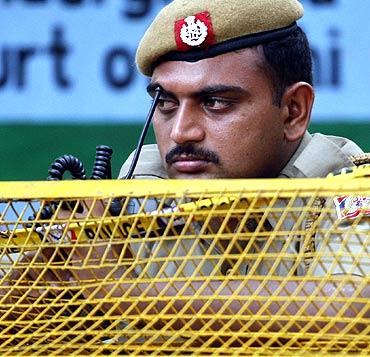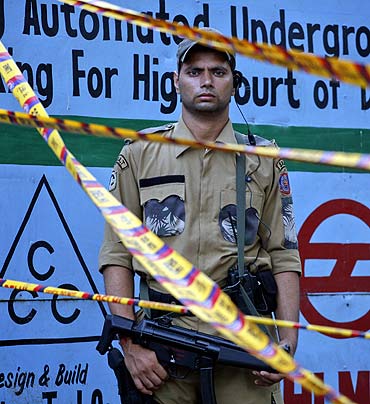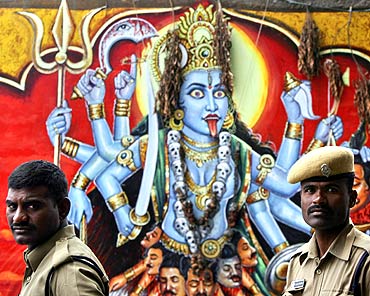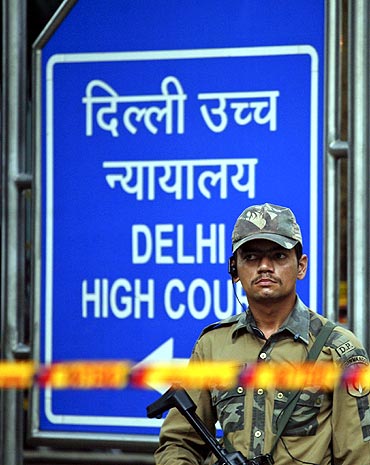 | « Back to article | Print this article |
NIA, 6 anti-terror state wings probe Delhi blast
Sources in the special cell have said that police forces in multiple states have been asked to track the regrouping of the banned Students Islamic Movement of India. Sahim Salim reports.
Investigators probing the Wednesday's Delhi high court blast are following up on several leads even though none of them are concrete.
Assisted by as many as six anti-terror wings of different state police forces, the National Investigation Agency is
pursuing leads that have come up.
Multiple terror groups are being probed, including the banned Students Islamic Movement of India. Sources in the special cell have told rediff.com that police forces in multiple states have been asked to track the regrouping of SIMI.
"Police forces in Uttar Pradesh, Madhya Pradesh, Karnataka, Kerala and Maharashtra are working on tracking the suspected regrouping of SIMI. We are taking the help of the Madhya Pradesh Anti-Terrorism Squad, which had
arrested 8 SIMI/ Indian Mujahideen suspects in June this year," a senior police officer said.
Click NEXT to read further...
'Sleeper modules of SIMI, IM may have started regrouping'
The Delhi police, which is 'assisting' the NIA probe, are taking help from ATS's of Haryana, Uttar Pradesh, Rajasthan, Maharashtra and Punjab police. Teams from these forces have already met with their Delhi police counterparts and the NIA to establish a possible pattern/connection between the various blasts that has occurred in India post 2008.
"This is especially important. Following the serial blasts orchestrated by the IM in India in 2008, the ATS's of different states had busted all major players of the Indian Mujahideen, which is just an offshoot of the banned SIMI. After different wings of the group like the cyber wing, the logistics wing, etc. were dismantled with the arrest of their heads and major players, they had almost become defunct. We believe that the sleeper modules or cells of these groups may have started regrouping. These groups may also have roped in ex-members of SIMI," the officer said.
What the officer said assumes importance because Zakir Hussain, an IM activist and ex-SIMI, had told interrogators (MP ATS) that he had done a recce of the Lucknow bench of Allahabad high court following his arrest in June, 2011. The regrouped SIMI/IM module was planning a series of attacks against the judiciary who had delivered the Ayodhya
verdict.
Click NEXT to read further...
'Emails claiming responsibility for blast may be bogus'
A team of NIA and Delhi police are also in Jammu and Kashmir after it was established that the first mail sent after the blast, purportedly from Harkat-ul-Jehadi, was sent from an internet caf there. The joint team of NIA, Delhi police and the J&K police is also coordinating with the NIA and Delhi police team in Lucknow, who are interrogating four suspected members of the Harket-ul-Jehadi. Two of these suspects reportedly hail from J&K.
The other lead the NIA is following is the investigation into the two contradicting terror emails received by media houses claiming responsibility for the blast. Though U K Bansal, secretary (internal security) in the ministry of home affairs said that the mail 'cannot be ignored and will be probed', investigators think both mails to be bogus.
The special cell, which had busted the IM module responsible for the Delhi serial blasts of 2008, say that the mail purportedly sent by IM on Thursday does not bear any resemblance to the earlier mails sent by them.
"One of the major breakthroughs we had during our investigation of the 2008 serial blasts was the mail sent by IM. That mail was nicely drafted and used brilliant English or Urdu. This one, however, was written rather crudely. Though we are pursuing it, in all probability it is bogus.
There is also a theory that these contradictory mails have been sent to mislead investigations, as through the media, terror outfits might have learnt that cyber surveillance is a key investigation tool," an investigator said.
Click NEXT to read further...
'No grudges against ministry for handing over probe to NIA'
Meanwhile, the Delhi police, which was sidelined by the ministry of home affairs in favor of NIA to investigate the case, has taken it in 'good spirit' and are actively assisting the NIA probe. IPS officers said that they hold no grudges against the ministry and that they are working as one.
"We understand our role here. Our officers in the special cell have good ground level sources and they will be key in cracking the case. NIA's national network and access will also help us in building a nation-wide network," an officer of the special cell said.
The special cell has not successfully investigated any terror-related cases for the past three years and is probably the reason they were sidelined by the ministry.
Their intelligence gathering, which pre-2008 used to be excellent, has become poor now. Other than effecting arrests of wanted gangsters or some absconding Maoists, the operations of the special cell have severely gone downhill.
Click NEXT to read further...
'NIA meets Delhi HC chief justice to discuss security'
The other branches of the Delhi police like the crime branch, the special branch and local police have meanwhile stepped up 'capacity building' in security. The special branch is actively maintaining a vigil on people entering and exiting the city.
A team of the NIA and the Delhi police met with Delhi high court Chief Justice Dipak Misra and discussed a security audit at the court. In the meeting the need for CCTV cameras, metal-detectors, vehicles' scanners, other security gadgets and stepping up of security was discussed.
The police also continued their stepped up vigil in the capital. Scores of vehicles were checked at various picket points set up across the capital city. Security has been beefed up at various markets, malls, etc. Vehicle scanners are being used in parking lots across the city and random checks are being conducted at these lots by beat officers.




